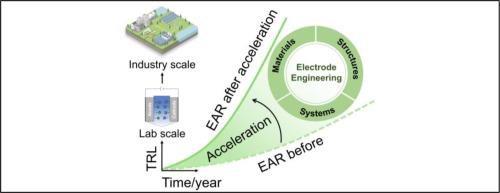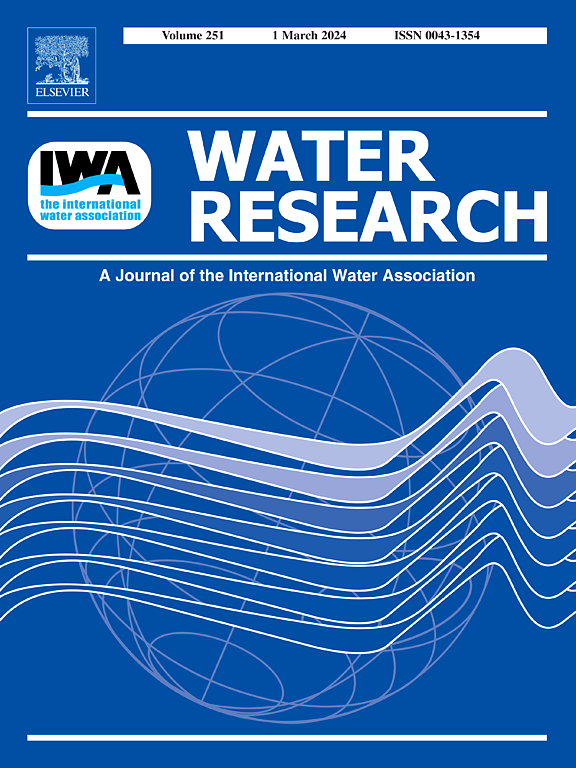Electrochemical ammonia recovery from wastewater: the critical roles of electrode engineering toward scale-up
IF 12.4
1区 环境科学与生态学
Q1 ENGINEERING, ENVIRONMENTAL
引用次数: 0
Abstract
Ammonia is indispensable for producing fertilizers that sustain the global population, yet its agricultural application contributes significantly to water pollution. Electrochemical technologies offer a renewable-energy-driven and chemical-free pathway for recovering ammonia directly from wastewater, representing a critical step toward a circular nitrogen economy and net-zero emissions in the wastewater sector. Nevertheless, translating lab-scale advances to industrialization remains constrained by technological hurdles. Emerging electrode-engineering strategies promise scalable, membrane-less electrochemical systems, yet a systematic and comparative assessment is lacking. In this review, we first present the electrochemical ammonia recovery pathway and elucidate the mechanisms of various electrode materials in this process. Secondly, we critically evaluate state-of-the-art scalable electrode systems for electrochemical ammonia recovery. Thirdly, we comparatively analyze the ammonia recovery performance at both the electrode-material and electrode-system levels, comprehensively discussing the current challenges and future research opportunities toward technological scale-up. Finally, we outline key research targets toward next-generation electrochemical engineering for sustainable ammonia recovery and wastewater treatment.

废水中氨的电化学回收:电极工程在规模化生产中的关键作用
氨对于生产维持全球人口的肥料是必不可少的,但其农业应用对水污染造成了重大影响。电化学技术为直接从废水中回收氨提供了一种可再生能源驱动和无化学物质的途径,是废水行业迈向循环氮经济和净零排放的关键一步。然而,将实验室规模的进步转化为工业化仍然受到技术障碍的限制。新兴的电极工程策略承诺可扩展的、无膜的电化学系统,但缺乏系统和比较的评估。在本文中,我们首先介绍了电化学氨回收途径,并阐明了各种电极材料在该过程中的作用机制。其次,我们批判性地评估了电化学氨回收的最先进的可扩展电极系统。第三,我们比较分析了电极-材料和电极-系统两个层面的氨回收性能,全面讨论了当前面临的挑战和未来技术规模化的研究机会。最后,我们概述了下一代电化学工程可持续氨回收和废水处理的重点研究方向。
本文章由计算机程序翻译,如有差异,请以英文原文为准。
求助全文
约1分钟内获得全文
求助全文
来源期刊

Water Research
环境科学-工程:环境
CiteScore
20.80
自引率
9.40%
发文量
1307
审稿时长
38 days
期刊介绍:
Water Research, along with its open access companion journal Water Research X, serves as a platform for publishing original research papers covering various aspects of the science and technology related to the anthropogenic water cycle, water quality, and its management worldwide. The audience targeted by the journal comprises biologists, chemical engineers, chemists, civil engineers, environmental engineers, limnologists, and microbiologists. The scope of the journal include:
•Treatment processes for water and wastewaters (municipal, agricultural, industrial, and on-site treatment), including resource recovery and residuals management;
•Urban hydrology including sewer systems, stormwater management, and green infrastructure;
•Drinking water treatment and distribution;
•Potable and non-potable water reuse;
•Sanitation, public health, and risk assessment;
•Anaerobic digestion, solid and hazardous waste management, including source characterization and the effects and control of leachates and gaseous emissions;
•Contaminants (chemical, microbial, anthropogenic particles such as nanoparticles or microplastics) and related water quality sensing, monitoring, fate, and assessment;
•Anthropogenic impacts on inland, tidal, coastal and urban waters, focusing on surface and ground waters, and point and non-point sources of pollution;
•Environmental restoration, linked to surface water, groundwater and groundwater remediation;
•Analysis of the interfaces between sediments and water, and between water and atmosphere, focusing specifically on anthropogenic impacts;
•Mathematical modelling, systems analysis, machine learning, and beneficial use of big data related to the anthropogenic water cycle;
•Socio-economic, policy, and regulations studies.
 求助内容:
求助内容: 应助结果提醒方式:
应助结果提醒方式:


